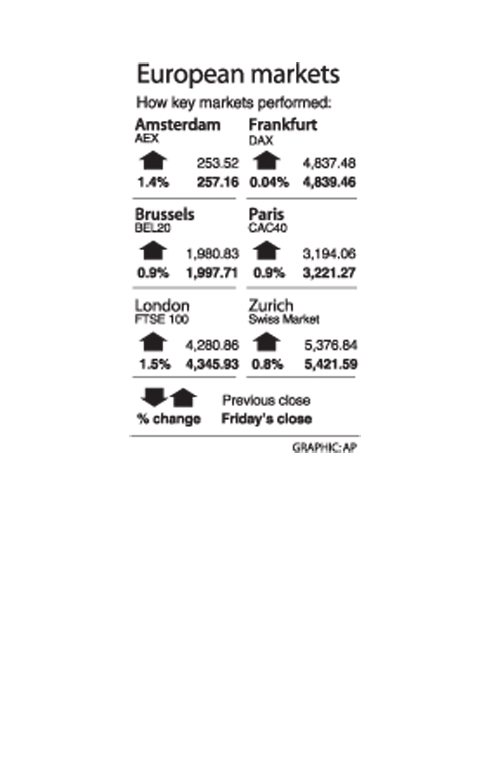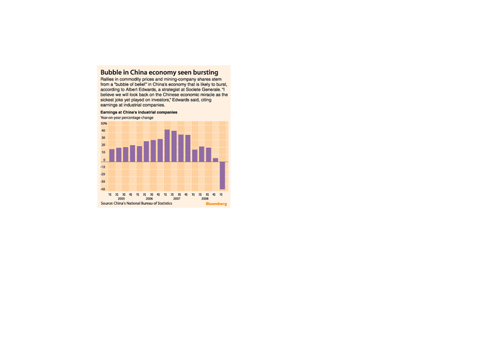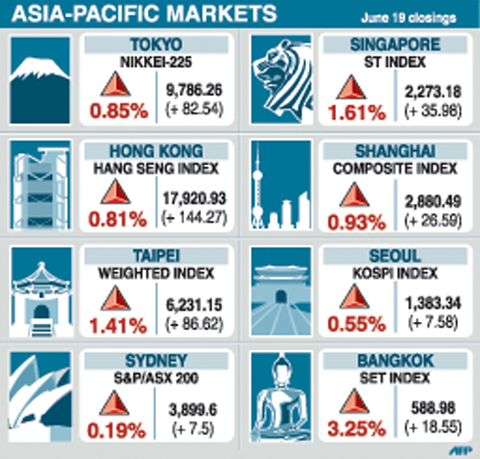Asian stocks fell for the first week in five as investors weighed the pace of economic recovery against valuations near the highest levels in five years.
Commodities producers led the drop amid concerns that demand for raw materials won’t support share-price gains. China National Offshore Oil Corp (CNOOC, 中國海洋石油), China’s largest offshore oil producer, dropped 11 percent in Hong Kong. Rio Tinto Group, the world’s third-largest mining company, slumped 17 percent in Sydney after selling new shares at a discount.
Powerchip Semiconductor Corp (力晶半導體) led a drop by chip companies, losing 17 percent, after extending the deadline on a convertible bond tender offer. Powerchip sank 17 percent to NT$3.33 on Friday.

Taiwan Semiconductor Manufacturing Co (TSMC, 台積電), the world’s largest maker of custom chips, lost 6.6 percent to NT$52.30. Morris Chang (張忠謀), the company’s chairman and chief executive officer, said on Thursday that revenue is likely to fall this year.
Samsung Electronics Co, the world’s biggest computer-memory maker, retreated 3.8 percent to 562,000 won.
“We’re probably more into a grinding period for the economy rather than a rapid recovery,” said Stephen Halmarick, Sydney-based head of investment markets research at Colonial First State, which holds about US$102 billion. “We’ve avoided the Armageddon scenario, but it doesn’t mean we’re back to the brave new world that we were all in a few years ago.”

The MSCI Asia-Pacific Index fell 3.5 percent this week to 101.48. The decline pared the gauge’s rally from a more than five-year low on March 9 to 44 percent. Japan’s Nikkei 225 Stock Average slumped 3.5 percent to 9,786.26 after closing above the 10,000 level for the first time since October last Friday.
Taiwanese share prices are expected to gain further on a continued technical rebound after heavy losses in the past few weeks, dealers said on Friday.
Bargain hunters are likely to turn active to boost the index as they are trying to rebuild positions following a sell-off, they said.

A stronger China market may lift investor confidence on hopes that the nation will serve as a cushion to the global economic woes, while Wall Street has shown its resilience after recent falls, they added.
Financial stocks are likely to outperform the broader market on expectations that Taiwan and China will sign a memorandum of understanding later this month or early next month for increasing cross-strait banking activities, they said.
The market is expected to challenge the nearest technical resistance of the 6,450-6,500 point range this week, any downside may be cushioned by a support at about 6,100 points, dealers said.
For the week to Friday, the weighted index fell 217.08 points, or 3.37 percent, to 6,231.15 after a 5.96 percent fall a week earlier.
Average daily turnover stood at NT$99.87 billion (US$3.04 billion), compared with NT$133.25 billion a week ago.
“The technical rebound started from Friday and the momentum accelerated until the end of the session. I expect more will follow as more bargain hunters are ready,” Grand Cathay Securities Corp (大華證券) analyst Mars Hsu said.
Hsu said he expects interest will focus on the financial sector.

Rainfall is expected to become more widespread and persistent across central and southern Taiwan over the next few days, with the effects of the weather patterns becoming most prominent between last night and tomorrow, the Central Weather Administration (CWA) said yesterday. Independent meteorologist Daniel Wu (吳德榮) said that based on the latest forecast models of the combination of a low-pressure system and southwesterly winds, rainfall and flooding are expected to continue in central and southern Taiwan from today to Sunday. The CWA also warned of flash floods, thunder and lightning, and strong gusts in these areas, as well as landslides and fallen

WAITING GAME: The US has so far only offered a ‘best rate tariff,’ which officials assume is about 15 percent, the same as Japan, a person familiar with the matter said Taiwan and the US have completed “technical consultations” regarding tariffs and a finalized rate is expected to be released soon, Executive Yuan spokeswoman Michelle Lee (李慧芝) told a news conference yesterday, as a 90-day pause on US President Donald Trump’s “reciprocal” tariffs is set to expire today. The two countries have reached a “certain degree of consensus” on issues such as tariffs, nontariff trade barriers, trade facilitation, supply chain resilience and economic security, Lee said. They also discussed opportunities for cooperation, investment and procurement, she said. A joint statement is still being negotiated and would be released once the US government has made

SOUTH CHINA SEA? The Philippine president spoke of adding more classrooms and power plants, while skipping tensions with China over disputed areas Philippine President Ferdinand Marcos Jr yesterday blasted “useless and crumbling” flood control projects in a state of the nation address that focused on domestic issues after a months-long feud with his vice president. Addressing a joint session of congress after days of rain that left at least 31 dead, Marcos repeated his recent warning that the nation faced a climate change-driven “new normal,” while pledging to investigate publicly funded projects that had failed. “Let’s not pretend, the people know that these projects can breed corruption. Kickbacks ... for the boys,” he said, citing houses that were “swept away” by the floods. “Someone has

‘CRUDE’: The potential countermeasure is in response to South Africa renaming Taiwan’s representative offices and the insistence that it move out of Pretoria Taiwan is considering banning exports of semiconductors to South Africa after the latter unilaterally downgraded and changed the names of Taiwan’s two representative offices, the Ministry of Foreign Affairs (MOFA) said yesterday. On Monday last week, the South African Department of International Relations and Cooperation unilaterally released a statement saying that, as of April 1, the Taipei Liaison Offices in Pretoria and Cape Town had been renamed the “Taipei Commercial Office in Johannesburg” and the “Taipei Commercial Office in Cape Town.” Citing UN General Assembly Resolution 2758, it said that South Africa “recognizes the People’s Republic of China (PRC) as the sole